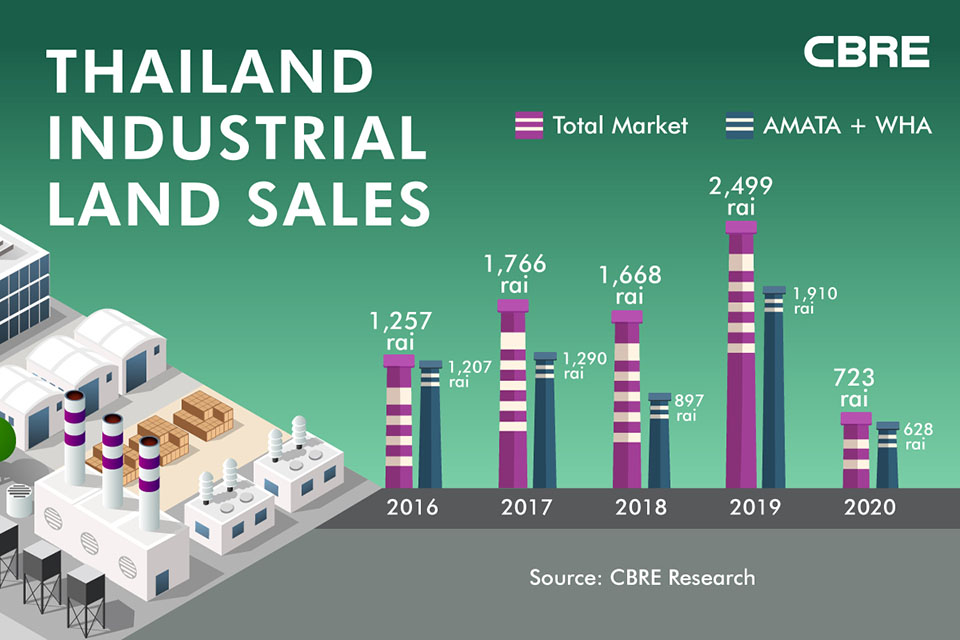
Bangkok, 11 August 2021 – The Thai industrial and logistics property sector has been proclaimed as the preferable market in these uncertain times for developers and investors. CBRE, an international property consultant, reveals that while the industrial sector has fared better than other commercial property sectors, it has not all been plain sailing. The industrial and logistics market has undergone areas of growth, but also areas of challenges which can be eased by a supportive government policy and the right expansion strategies.
Adam Bell, Head of Transaction and Advisory Services – Industrial and Logistics, CBRE Thailand, comments, “Before Covid-19, the ‘China Plus One’ model saw manufacturers looking to diversify supply chains and manufacturing bases outside mainland China due to rising labor costs, diversification of risk and ongoing trade disputes. Thailand, Vietnam and Malaysia were predicted to be the main beneficiaries of this movement, yet to date in Thailand, the land sale numbers on industrial estates are not showing this. To gauge Thailand’s success in capturing this Foreign Direct Investment (FDI), we look at the industrial estate land sales from developers like WHA Corporation and AMATA Corporation. Between 2016-2020, land sales did not show that Thailand was benefiting from the China Plus One model.”
Vietnam has been more successful in attracting this investment, with their competitive advantage being a large, young workforce and the low labour rates. Labour intensive manufacturers have shown preference to Vietnam over Thailand.
“While Thailand may no longer compete in terms of labour rates; it still does have competitive advantages over Vietnam. A well-developed infrastructure, professionally developed and managed industrial estates, extensive clusters of specialized suppliers and skills and a track record over 40 years of attracting FDI. This should enable Thailand to benefit from the China Plus One model,” Bell added Bell.

CBRE believes there is significant pent-up demand for industrial land especially on the major industrial estates in the Eastern Seaboard, but due to the current Covid-19 travel restrictions, and difficulties for Chinese nationals travelling abroad, Thailand still waits to benefit from this potential FDI.
One area which has undoubtedly seen growth in the industrial and logistics sector is the warehouse market. With the growth of e-commerce this sector has been expanding for several years, but the pandemic has turbo-charged the sector. E-commerce companies are expanding exponentially as people are moving to online shopping with lock downs and work/stay at home advisories being in affect. CBRE believes a focused government stimulus measure on the industrial and logistics market can unlock potential growth and ease the warehouse zoning challenges the sector is facing.
Paul Srivorakul, Group CEO of aCommerce has previously commented in Bangkok Post that the country’s e-commerce is growing at extraordinary rates. The growth in 2020 alone was remarkable, although only 3-4% of total retail has gone online. Many brands and retailers are quickening their digital transformation – a significant increase from the 5-8% e-commerce share of their total revenues in pre-Covid-19 now comprises of 25-30%.
This type of growth drives enormous warehouse space demands from the large e-commerce players like aCommerce, JD.Com, Shopee and Lazada to store the goods prior to nationwide distribution to customers.
Bell added “There are certain challenges on the horizon, they are positive challenges from this rapid growth. With the nature of E-commerce, the ideal location should be close to town and convenient for connectivity. The hot spot for e-commerce warehousing is on Bangna-Trad Road between km.18 – km.23, where connectivity to Bangkok, Suvarnabhumi and Laem Chabang deep seaport come together in an area zoned for large warehouse properties favoured by e-commerce companies. In this location, CBRE is now seeing significant shortage of large developable land plots, and of those plots available, the land prices are making justification of warehouse development challenging.”
“Certain businesses, like e-commerce, in the warehouse market have flourished during the pandemic, nonetheless in the coming years, CBRE expects to see upward pressure on rents in this area, or developers and occupiers alike will have to start looking at alternative locations where lower rents or land prices could offset slightly inferior location. These are the challenges from productive changes. With a dedicated governmental policy towards a new town planning with expanded zoning, Thailand will once more gain advantages in the regional warehousing competition,” Bell concluded.
 |
 |
 |





